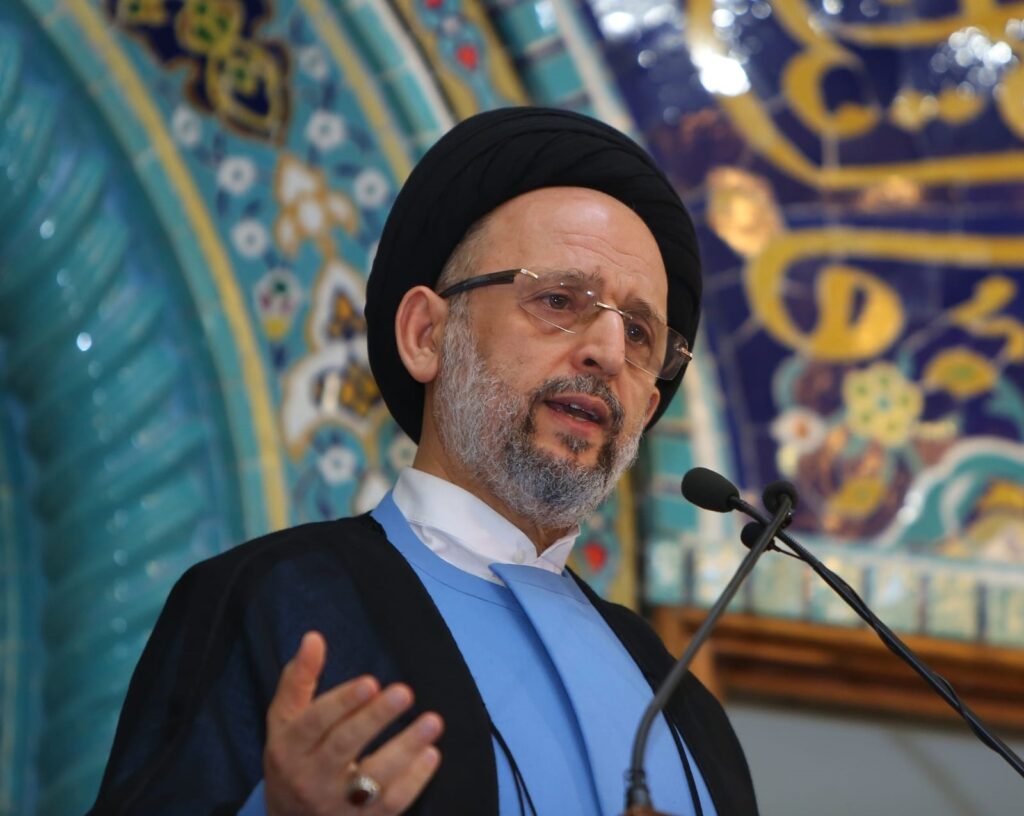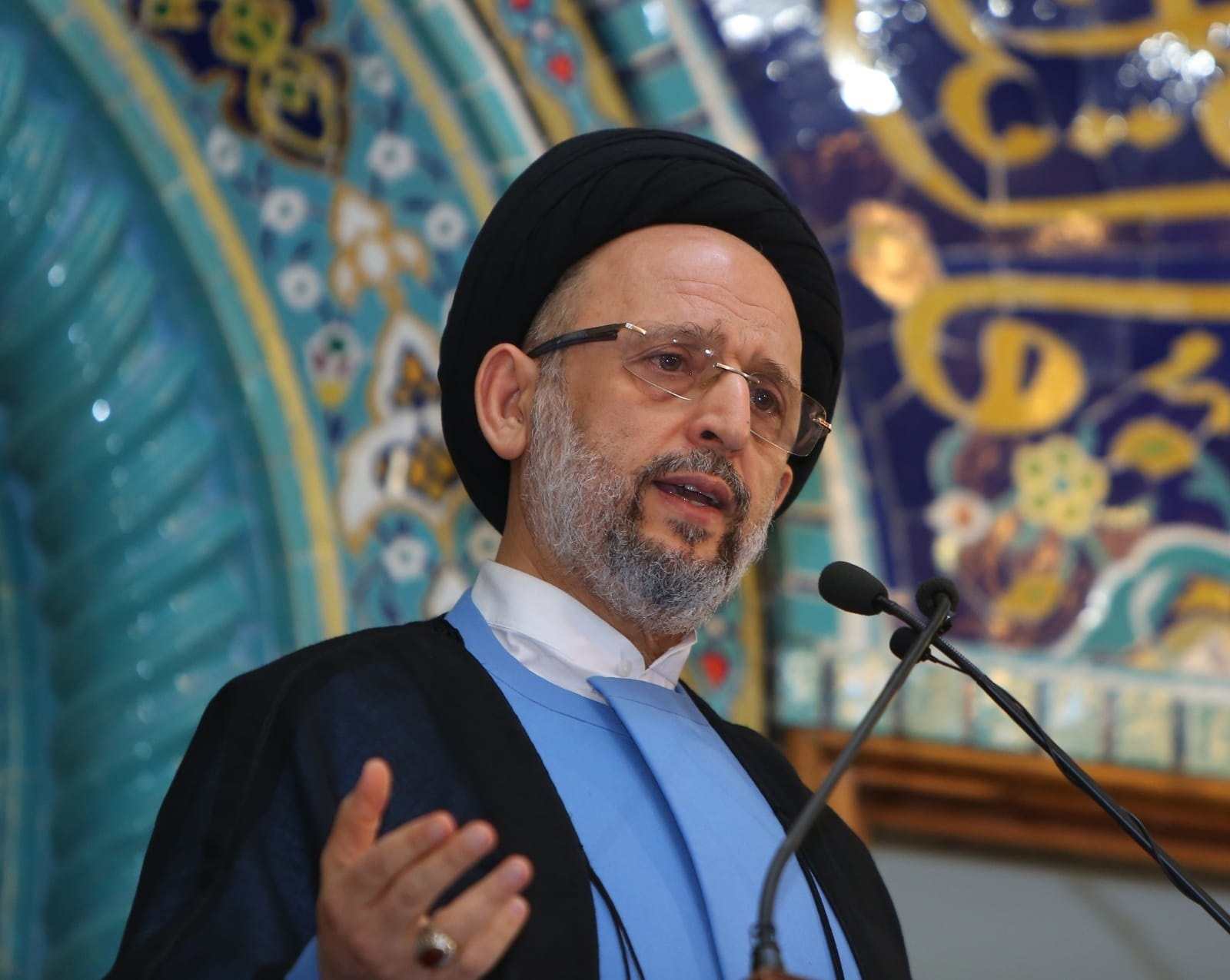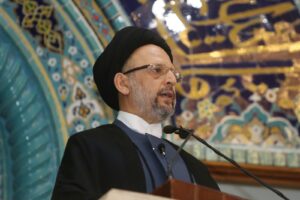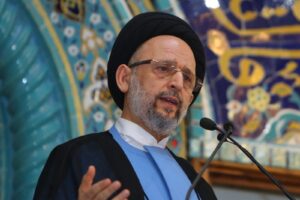In The Name of Allah, The Compassionate, The Merciful
.
His Eminence, Sayyed Ali Fadlallah, delivered the two Friday prayer sermons at the Imamain Al-Hassanain Mosque, Muharram 27, 1446/August 2, 2024. Several prominent religious scholars, dignitaries, and hundreds of believers attended the Jumu’a prayer. Following is a summary of the sermons.
The First Sermon
Allah, the Most Exalted, says in His Glorious Book: Allah only wishes to remove uncleanness from you, O members of the family, and to purify you thoroughly... Allah, The Most Exalted, speaks the truth.
On the twenty-fifth of Muharram, we commemorated the passing of one of the members of this pure household whom Allah has purified and from whom He has removed all impurity. This is the household referred to by the Messenger of Allah (p.) when he said: “I leave among you that which if you hold fast to, you will never go astray after me: the Book of Allah and my progeny.” He was Imam Ali ibn al-Hussein (a.s.), Zain al-Abidin, and Sayyid al-Sajideen.
When this Imam is mentioned, knowledge, forbearance, worship, generosity, benevolence, giving, and good character are also remembered. He is associated with the most difficult phases faced by the family of the Messenger of Allah , particularly the tragedy of Karbala. This Imam witnessed this event in all its details, but he was prevented from participating due to an illness that confined him, which began on the ninth day of Muharram. Before his very eyes, he saw his father, his brothers, uncles, and family members, as well as the companions of his father, martyred. This is the harshest thing a person could face. Now, fourteen centuries later, our hearts ache when we listen to the events of Karbala, so imagine the pain of someone who witnessed it up close.
After the battle, Imam Zain al-Abidin endured captivity and the humiliation of being a prisoner along with his aunts and the women of Karbala. Despite all these pains, calamities, and the chains of captivity, he remained steadfast, unwavering in his faith and strong in his devotion to Allah. This is expressed in his confrontation with Ubaydullah ibn Ziyad when threatened with death: “Do you threaten me with death, O son of Ziyad? Do you not know that killing us is a tradition and our honor from Allah is martyrdom?”
He also expressed this when facing Yazid, who was reveling in what he considered a victory: “O son of Muawiya… my grandfather, Ali ibn Abi Talib, carried the banner of the Messenger of Allah in the battles of Badr, Uhud, and Al-Ahzab, while your father and grandfather carried the banners of the infidels.” He also said: “Woe to you, Yazid! If you knew what you have done and what crime you have committed, you would flee to the mountains and cover yourself in ashes. Be assured of disgrace …”
Upon reaching Medina, his place of residence and the base from which he would carry out his responsibilities, the Imam worked on two fronts. The first was to counter all attempts by the Umayyads to distort the goals for which Imam Husein (a.s.) rose. He highlighted these goals, raised awareness among the Nation about them, and exposed the enormity of the crime committed by Yazid and his cohorts, thereby igniting the spirit of revolution. Many revolts originated from his house, including that led by his son Zaid.
The second front was to guide the Nation spiritually and intellectually. The Imam saw that it needed reformation, rebuilding to emerge from its ignorance, weakness, and submission, which had led to the betrayal of Hussein(a.s.) and Imam Hasan (a.s.) before him. He expressed this through his words, sermons, and prayers, transforming supplication from merely a spiritual and emotional connection between man and his Lord to a means for change, building beliefs, concepts, behaviors, and education. Supplication was no longer just about asking for forgiveness, mercy, entry into paradise, or relief from worries, but also a tool for intellectual, doctrinal, spiritual, social, and political education.
In this context, his “Treatise on Rights” is one of the most important documents concerning rights. We call for this treatise to be present in every home, to be embraced and guided by in all life. In it, he outlined individual and social responsibilities, mutual obligations between people and towards Allah, oneself, and prescribed duties, expanding their scope beyond personal obligations to include responsibilities towards one’s faculties, granted by Allah, and towards others in all their diversities. He provided a roadmap to fulfill these duties.
Today, we will pause to reflect on some of these responsibilities, to benefit from their contents and perform our roles accordingly.
“And the right of your soul against you is that you should strive in the obedience of Allah,” utilizing all your abilities and resources to achieve the goals for which you were created, whether in this world, by establishing civilization and justice, or in the hereafter, as indicated by Amir al-Mu’minin : “There is no price for your soul except paradise, so do not sell it for anything less.” Do not squander it in frivolity and amusement. Another right that pertains to the senses is: “As for the right of the tongue, it is to honor it by refraining from obscene language,” that is, to train it to speak good and avoid unnecessary talk that has no benefit, to be kind to people, and to speak well of them, only saying what is good about them.
Regarding the right of hearing, he said: “Keep it away from listening to backbiting, and from hearing what is forbidden (like slander and impermissible singing ( that incite instincts), which threaten a person’s integrity and lead them away from the path of Allah). Make your hearing a pathway to your heart only for noble words that bring good to your heart or teach you good manners.”
“As for the right of your sight, it is to lower it from what is not lawful for you and to learn a lesson by looking through it,” for the sight is a gateway to reflection.
A hadith states: “The eye is the spy of the heart and the messenger of the mind.”
“As for the right of your hand, it is not to extend it to what is not lawful for you,” do not use it to harm others, or reach out for forbidden wealth, or shake hands with someone who is forbidden to you, or use it to oppress and harm others.
“As for the right of the people of your faith in general, it is to harbor peace and mercy for them… and to refrain from harming those who wrong you, and to love for them what you love for yourself, and to dislike for them what you dislike for yourself. Regard their elders as your father, their youth as your brothers, their elderly women as your mother, and their children as your own.”
As for the right of someone who wrongs you, forgive them, and if you know that forgiveness harms them, then seek redress. Allah the Exalted said: {And whoever avenges himself after having been wronged – those have not upon them any cause [for blame]}.
The greatest right that should be present for everyone who knows Allah in His greatness and power, or in His mercy and forgiveness and love for His servants, is the right of Allah: “As for the greatest right of Allah upon you, it is to worship Him without associating anything with Him,” by fulfilling His will in this life and not associating anyone with Him in word, deed, and behavior. If you do this sincerely (making your actions purely for Allah and Allah alone), Allah promises to take care of your worldly and afterlife affairs and preserve what you love of them.
Dear ones:
Our devotion to Imam Zain al-Abidin on the anniversary of his death is not merely through holding mourning sessions, visiting his shrine, or offering feasts in his name, but by being faithful to all the heritage he left behind, including his biography, supplications, words, wisdom, and sermons, and in all the responsibilities he commanded us to uphold. Adhering to these will help us elevate our relationship with Allah and enrich our souls with human excellence and good morals, as well as courage and strength, and build a comprehensive Islamic character that encompasses all aspects of life.
We ask Allah to make us among those who listen to the words and follow the best of them, for He is the Answerer and the Fulfiller of prayers.
The second sermon
Worshippers of Allah, I advise you and advise myself to follow the advice of Imam Zain al-Abidin in his approach to dealing with someone who insulted him in front of his companions. On that occasion, he said to his companions, “You have heard what this man said. I would like you to come with me to him so that you may hear my response to him.” (When they went, they were certain that the Imam would be harsh with him.) But on the way, they heard him reciting: {And those who restrain anger and pardon people, and Allah loves the doers of good}. They realized that the Imam intended good for him.
When the Imam reached the house of that man, he came out ready for confrontation. The Imam calmed him down and said, “My brother, if what you said about me is true, may Allah forgive me. If it is not true, may Allah forgive you.” A few words were enough to make the man say, “I said things about you that are not true, and I am more deserving of them.” After that, the man became one of the Imam’s most devoted followers.
Here, we ask: What if the Imam had responded to this man with the same hostility or even harsher, as usually happens? Would he have achieved what he did with his approach? We are in dire need of this method to cool down the tensions within us, to become stronger, more responsible, and more capable of facing challenges.
The beginning of the escalation that the enemy initiated a few days ago, which naturally has serious repercussions as this entity crossed red lines in the ongoing conflict within Palestine or from its supporting positions, could push the region into an explosion that the enemy will not be immune to its consequences.
This was evidenced by targeting the heart of the southern suburb in a densely populated area, resulting in a large number of civilian martyrs and wounded and the assassination of one of the most prominent symbols of resistance. The Zionist enemy justified this by referring to what happened in Majdal Shams, with a flimsy excuse for which the enemy did not provide evidence and even rejected a neutral investigation. This was followed by the assassination of the historical symbol of resistance, Ismail Haniyeh, head of the political bureau of Hamas, who was hosted by the Islamic Republic of Iran, clearly violating international conventions and respecting state sovereignty.
The enemy sought to regain the deterrence it lost in the field by adopting an assassination policy, implying that it still holds the upper hand and can reach any place, aiming to weaken the resistance that has troubled and confused its entity. However, it has yet to realize that this assassination policy for resistance leaders and any of its symbols has not previously led to ending the resistance; instead, it has strengthened it, making it more present in the field and pushing it further in confronting this enemy.
It has become clear that what encourages this entity is the support it continues to receive from its supporting countries, despite all its crimes. These countries today deploy their warships and military apparatus to defend this enemy.
While we extend our deepest condolences to the resistance in Lebanon and Palestine for their martyrs who joined the procession of martyrs in support of the Palestinian cause and its people, and to the families and relatives of the martyrs, we ask Allah to grant the martyrs what He promised them and to grant the wounded a speedy recovery.
We see the danger of what the enemy has done, which cannot go unanswered by the resistance in Palestine and from its supporting positions in Lebanon, Iraq, Yemen, and the Islamic Republic of Iran. But we trust in the wisdom that the resistance leaders and the supporting forces have shown, which they still adhere to when making any decision to respond to aggression, considering the objective circumstances, while they strive to deter the Zionist entity and prevent it from continuing its reckless adventures.
Here, we renew our call to the world, which speaks of its desire to avoid expanding the circle of war, that the way to achieve this is not by calling for restraint from those who are attacked and targeted by this enemy with its massacres and siege, but by stopping this entity and exerting pressure on it with the means they possess to comply with the demand to end the war and give the Palestinian people their right to self-determination. It is ironic that we witness in this world those who call for not expanding the circle of war while at the same time declaring their support for this entity, which encourages this entity to continue its war and aggression.
We must, in the face of everything happening, not succumb to the intimidations carried out by the enemy and all those revolving around it, aiming to defeat us psychologically and spiritually. We must trust in Allah first and foremost, in the positions of strength we possess, and in the weaknesses of this enemy …We do not want to underestimate the capabilities and power of this enemy, but at the same time, we should not underestimate our capabilities and potentials, with which we have been able and can continue to thwart the enemy’s goals and disrupt its plans if we cannot completely nullify them. We trust in Allah’s promise to us when He says: {If you support Allah, He will support you and plant firmly your feet.}





